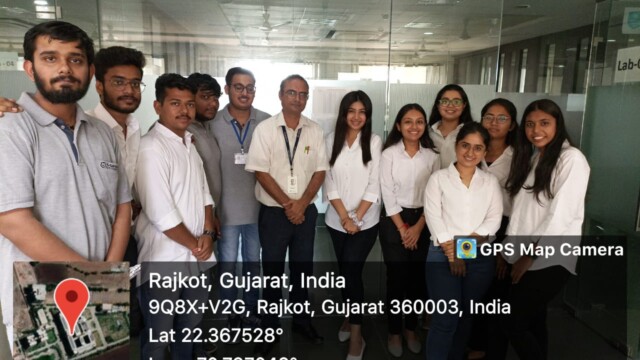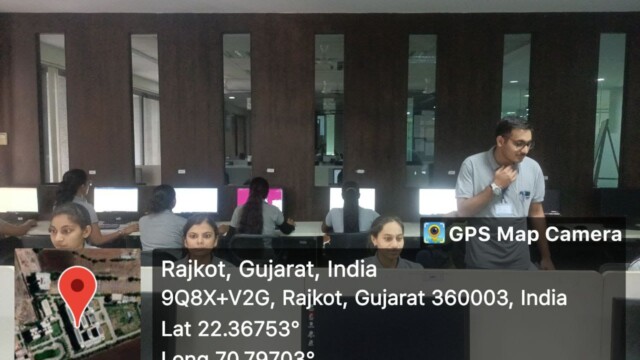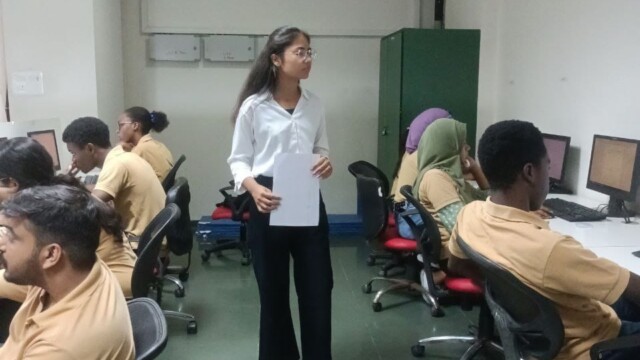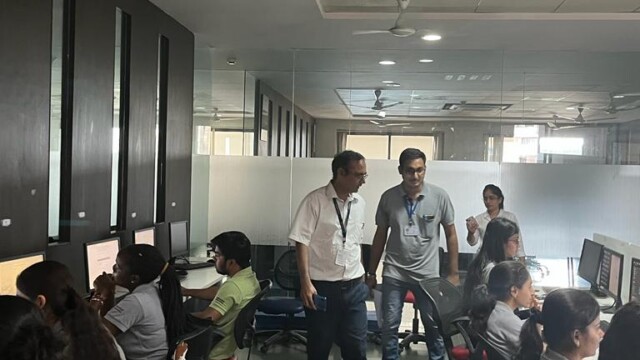ELECTRICAL ENGINEERING (BTECH)
Overview
Electrical Engineering has a wide scope in today’s industrial requirement era because without energy, survival of anything is not possible. Due to diversities in industry requirement, electrical engineering has been subdivided into various specializations like High Voltage Engineering, Power System Engineering, Renewable Energy and Technology, Control and Automations, Power Electronics and Drives. Each of these fields of Electrical Engineering has its own relevance and role in the industry.
The department also offers Post Graduate programmes in Electrical Engineering (Power System), Electrical Engineering (Power Electronics and Electrical Drives) and Electric & Hybrid Vehicle.

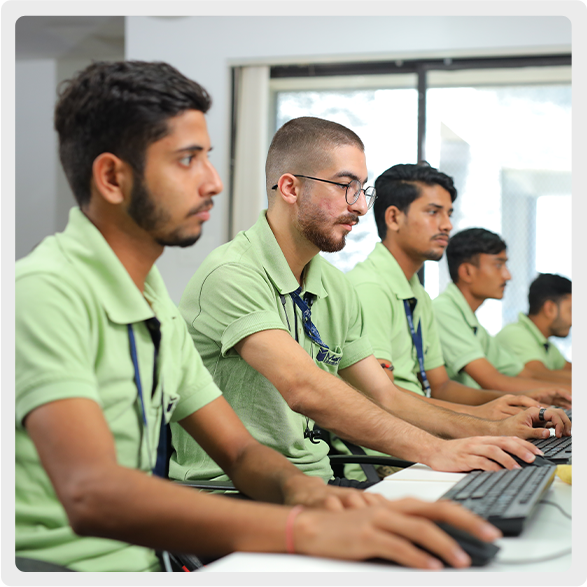
Educational
Objectives
![]() Prepare graduates as per industry and societal needs
Prepare graduates as per industry and societal needs
![]() Make them skilled to work with the latest technology including DSP, Microcontrollers, Power Electronics, Renewable, Modern Computer Tools etc.
Make them skilled to work with the latest technology including DSP, Microcontrollers, Power Electronics, Renewable, Modern Computer Tools etc.
![]() To constantly interact with scholars from industry, research organizations and academia to produce globally competent and locally relevant engineering graduates.
To constantly interact with scholars from industry, research organizations and academia to produce globally competent and locally relevant engineering graduates.
![]() To nurture human values, sense of responsibility and ethics for all stakeholders.
To nurture human values, sense of responsibility and ethics for all stakeholders.
Eligibility Criteria
| For Indian and International Students | ||
|---|---|---|
| 12th (HSc) in Science with a minimum of 45%. They should have appeared in GUJCET and should be registered under ACPC. Equivalent Qualification is required for international students |
Admission Process
Once you generate the PIN from bank through online or offline process
Register yourself on
Fill the Application Details
Choice Filling
(1, 2, 3..)
You’re on the path to DISCOVER yourself
Reporting at College
Actual Admission and Token Fee Payment
Admission Process
Once you generate the PIN from bank through online or offline process
yourself on
Application
Details
Filling
Rounds
(1, 2, 3..)
Admission
and Token
Fee Payment
College
path to
DISCOVER
yourself
Duration and Fees Structure
| For Indian Student (INR) | ||
|---|---|---|
| Electrical Engineering | 4 Years | 57500/- (Per Sem) |
| For International Student (USD) | ||
|---|---|---|
| Electrical Engineering | 4 Years | 1600/- (Annual) |
Curriculum
| B. Tech. Year I, Sem I | Evaluation Scheme | ||||||||||||
| Subject Code | Subject Name | Category | Teaching Scheme (Hours) | Credits | Theory Marks | Tutorial/ Practical Marks | Total Marks | ||||||
| AICTE | CBSE | Theory | Tutorial | Practical | ESE(E) | IA | CSE | Viva (V) | Term work (TW) | ||||
| AU0001 | NATIONAL CADET CORPS** | MC | 1 | 0 | 2 | 2 | 0 | 0 | 0 | 0 | 0 | 0 | |
| 01CE1101 | COMPUTER PROGRAMMING | ESC | ES-UC | 4 | 0 | 2 | 5 | 50 | 30 | 20 | 25 | 25 | 150 |
| 01EE1113 | ELECTRICAL WORKSHOP | LC-EE | ES-UC | 0 | 0 | 2 | 1 | 0 | 0 | 0 | 25 | 25 | 50 |
| 01CR1103 | VALUE EDUCATION | MC | NCC | 2 | 0 | 0 | 0 | 0 | 0 | 0 | 50 | 50 | 100 |
| 01EE1111 | BASICS OF ELECTRICAL ENGINEERING | ESC | ES-UC | 4 | 0 | 2 | 5 | 50 | 30 | 20 | 25 | 25 | 150 |
| 01GS0103 | INDIAN CONSTITUTION | MC | NCC | 1 | 0 | 0 | 0 | 0 | 0 | 0 | 0 | 0 | 0 |
| 01GS1101 | ENGINEERING PHYSICS | BSC | BS-UC | 3 | 0 | 2 | 4 | 50 | 30 | 20 | 25 | 25 | 150 |
| 01MA0106 | CALCULUS | BSC | BS-UC | 3 | 2 | 0 | 5 | 50 | 30 | 20 | 25 | 25 | 150 |
| 01CR0105 | VERBAL ABILITY – 1 | MC | NCC | 1 | 0 | 0 | 0 | 50 | 0 | 0 | 0 | 50 | 100 |
| Total | 29 | 19 | 2 | 8 | 20 | 250 | 120 | 80 | 175 | 225 | 850 | ||
| B. Tech. Year I, Sem II | Evaluation Scheme | ||||||||||||
| Subject Code | Subject Name | Category | Teaching Scheme (Hours) | Credits | Theory Marks | Tutorial/ Practical Marks | Total Marks | ||||||
| AICTE | CBSE | Theory | Tutorial | Practical | ESE(E) | IA | CSE | Viva (V) | Term work (TW) | ||||
| 01AU0102 | NATIONAL CADET CORPS-2** | MC | 1 | 0 | 2 | 2 | 0 | 0 | 0 | 0 | 0 | 0 | |
| 01EE1112 | BASIC ELECTRONICS | ESC | ES-UC | 3 | 0 | 2 | 4 | 50 | 30 | 20 | 25 | 25 | 150 |
| 01CR0104 | PROFESSIONAL ETHICS | MC | NCC | 1 | 0 | 0 | 0 | 0 | 0 | 0 | 50 | 50 | 100 |
| 01ME1101 | BASICS OF MECHANICAL ENGINEERING | ESC | ES-UC | 3 | 0 | 2 | 4 | 50 | 30 | 20 | 25 | 25 | 150 |
| 01EN1101 | BASICS OF ENVIRONMENTAL STUDIES | ESC | ES-UC | 2 | 0 | 0 | 0 | 50 | 30 | 20 | 0 | 0 | 100 |
| 01MA0104 | LINEAR ALGEBRA | BSC | BS-UC | 3 | 2 | 0 | 5 | 50 | 30 | 20 | 25 | 25 | 150 |
| 01ME1103 | ENGINEERING DRAWING | ESC | ES-UC | 2 | 0 | 4 | 4 | 50 | 30 | 20 | 25 | 25 | 150 |
| 01SL0102 | READING & WRITING FOR TECHNOLOGY* | HSMC | GN-UC | 2 | 0 | 0 | 2 | 0 | 30 | 20 | 25 | 25 | 100 |
| 01SL0103 | SPEAKING & PRESENTATION SKILLS* | HSMC | GN-UC | ||||||||||
| 01CR0106 | VERBAL ABILITY – 2 | MC | NCC | 1 | 0 | 0 | 0 | 50 | 0 | 0 | 0 | 50 | 100 |
| Total | 29 | 17 | 2 | 10 | 19 | 300 | 180 | 120 | 175 | 225 | 1000 | ||
| B. Tech. Year II, Sem III | Evaluation Scheme | ||||||||||||
| Subject Code | Subject Name | Category | Teaching Scheme (Hours) | Credits | Theory Marks | Tutorial/ Practical Marks | Total Marks | ||||||
| Theory | Tutorial | Practical | ESE(E) | IA | CSE | Viva (V) | Term work (TW) | ||||||
| 01MA1303 | Applied Mathematics for Electrical Engineering | BSC | BS-UC | 3 | 2 | 0 | 5 | 50 | 30 | 20 | 25 | 25 | 150 |
| 01EE1301 | Electrical Circuit Analysis | PCC-EE | PC | 4 | 0 | 2 | 5 | 50 | 30 | 20 | 25 | 25 | 150 |
| 01EE1302 | Analog and Digital Electronics | PCC-EE | PC | 3 | 0 | 2 | 4 | 50 | 30 | 20 | 25 | 25 | 150 |
| 01EE1303 | Electrical Machines-I | PCC-EE | PC | 3 | 0 | 2 | 4 | 50 | 30 | 20 | 25 | 25 | 150 |
| 01EE1304 | Electrical and Electronic Instruments | PCC-EE | PC | 2 | 0 | 2 | 3 | 50 | 30 | 20 | 25 | 25 | 150 |
| 01SL1401 | Communication Skill for Engineers | HSMC | GN-UC | 2 | 0 | 0 | 2 | 0 | 0 | 0 | 25 | 25 | 50 |
| 01EE1305 | Design Thinking and Problem Solving Skills | PROJ-EE | EE | 0 | 0 | 2 | 1 | 0 | 0 | 0 | 25 | 25 | 50 |
| 01CR0303 | Quantitative & Logical Ability – 1 | MC | NCC | 1 | 0 | 0 | 0 | 50 | 0 | 0 | 0 | 0 | 50 |
| Total | 30 | 18 | 2 | 10 | 24 | 300 | 150 | 100 | 175 | 175 | 900 | ||
| B. Tech. Year II, Sem IV | Evaluation Scheme | ||||||||||||
| Subject Code | Subject Name | Category | Teaching Scheme (Hours) | Credits | Theory Marks | Tutorial/ Practical Marks | Total Marks | ||||||
| Theory | Tutorial | Practical | ESE(E) | IA | CSE | Viva (V) | Term work (TW) | ||||||
| 01EE1401 | Power System-I | PCC-EE | PC | 3 | 1 | 0 | 4 | 50 | 30 | 20 | 0 | 0 | 100 |
| 01EE1402 | Power Electronics | PCC-EE | PC | 3 | 0 | 2 | 4 | 50 | 30 | 20 | 25 | 25 | 150 |
| 01EE1403 | Control System Engineering | PCC-EE | PC | 4 | 0 | 2 | 5 | 50 | 30 | 20 | 25 | 25 | 150 |
| 01EE1404 | Field Theory | PCC-EE | PC | 3 | 0 | 0 | 3 | 50 | 30 | 20 | 0 | 0 | 100 |
| 01EE1405 | Field Theory Lab | LC-EE | PC | 0 | 0 | 2 | 1 | 0 | 0 | 0 | 25 | 25 | 50 |
| 01EE0408 | CREATIVITY, PROBLEM SOLVING AND INNOVATION | HSMC | GN-UC | 2 | 0 | 0 | 2 | 50 | 30 | 20 | 0 | 0 | 100 |
| 01CR0402 | Quantitative & Logical Ability – 2 | MC | NCC | 1 | 0 | 0 | 0 | 50 | 0 | 0 | 0 | 0 | 50 |
| Open Elective* | OEC-EE | IEC | 3 | 0 | 0 | 3 | 50 | 30 | 20 | 0 | 0 | 100 | |
| Total | 26 | 19 | 1 | 6 | 22 | 350 | 180 | 120 | 75 | 75 | 800 | ||
| B. Tech. Year II, Sem IV | Evaluation Scheme | ||||||||||||
| Subject Code | Subject Name | Category | Teaching Scheme (Hours) | Credits | Theory Marks | Tutorial/ Practical Marks | Total Marks | ||||||
| Theory | Tutorial | Practical | ESE(E) | IA | CSE | Viva (V) | Term work (TW) | ||||||
| 01EE1401 | Power System-I | PCC-EE | PC | 3 | 1 | 0 | 4 | 50 | 30 | 20 | 0 | 0 | 100 |
| 01EE1402 | Power Electronics | PCC-EE | PC | 3 | 0 | 2 | 4 | 50 | 30 | 20 | 25 | 25 | 150 |
| 01EE1403 | Control System Engineering | PCC-EE | PC | 4 | 0 | 2 | 5 | 50 | 30 | 20 | 25 | 25 | 150 |
| 01EE1404 | Field Theory | PCC-EE | PC | 3 | 0 | 0 | 3 | 50 | 30 | 20 | 0 | 0 | 100 |
| 01EE1405 | Field Theory Lab | LC-EE | PC | 0 | 0 | 2 | 1 | 0 | 0 | 0 | 25 | 25 | 50 |
| 01EE0408 | CREATIVITY, PROBLEM SOLVING AND INNOVATION | HSMC | GN-UC | 2 | 0 | 0 | 2 | 50 | 30 | 20 | 0 | 0 | 100 |
| 01CR0402 | Quantitative & Logical Ability – 2 | MC | NCC | 1 | 0 | 0 | 0 | 50 | 0 | 0 | 0 | 0 | 50 |
| Open Elective* | OEC-EE | IEC | 3 | 0 | 0 | 3 | 50 | 30 | 20 | 0 | 0 | 100 | |
| Total | 26 | 19 | 1 | 6 | 22 | 350 | 180 | 120 | 75 | 75 | 800 | ||
| B. Tech. Year III, Sem VI | Evaluation Scheme | ||||||||||||
| Subject Code | Subject Name | Category | Teaching Scheme (Hours) | Credits | Theory Marks | Tutorial/ Practical Marks | Total Marks | ||||||
| Theory | Tutorial | Practical | ESE(E) | IA | CSE | Viva (V) | Term work (TW) | ||||||
| 01CR0602 | Quantitative Aptitude and Verbal Ability | MC | NCC | 1 | 0 | 0 | 0 | 50 | 0 | 0 | 0 | 0 | 50 |
| 01EE1601 | Solid State Drives | PCC-EE | PC | 3 | 0 | 2 | 4 | 50 | 30 | 20 | 25 | 25 | 150 |
| 01EE1602 | Microcontroller & Embedded Systems | PCC-EE | PC | 3 | 0 | 2 | 4 | 50 | 30 | 20 | 25 | 25 | 150 |
| 01EE1603 | Interconnected Power Systems | PCC-EE | PC | 4 | 0 | 2 | 5 | 50 | 30 | 20 | 25 | 25 | 150 |
| 01EE1604 | MOOC/ SEMINAR | PROJ-EE | EE | 0 | 0 | 4 | 2 | 0 | 0 | 0 | 25 | 25 | 50 |
| Professional Elective-II | PEC-EE | PEC | 3 | 0 | 0 | 3 | 50 | 30 | 20 | 0 | 0 | 100 | |
| Institute Elective | OEC-EE | IEC | 3 | 0 | 0 | 3 | 50 | 30 | 20 | 0 | 0 | 100 | |
| Total | 27 | 17 | 0 | 10 | 21 | 300 | 150 | 100 | 100 | 100 | 750 | ||
| Professional Elective – II | ||
| Subject Code | Subject Name | Group |
| 01EE1605 | Batteries and Battery Management Systems | EV Group |
| 01EE1606 | Distributed Energy Resources and Energy Storage Systems | Renewable |
| 01EE1607 | Switch Mode Power Supplies | Power Electronics |
| 01EE1608 | Power System Practice and Design | Power System |
| Institute Elective II & III | |||
| Subject Code | Subject Name | Department | Elective |
| 01CE0531 | Python Programming | CE/IT | Inst. Elective |
| 01CT0521 | Introduction to HDL | ICT | Inst. Elective |
| 01CT0522 | Analog & Digital Communication | ICT | Inst. Elective |
| 01CE0532 | Data Structure and Algorithms | CE/IT | Inst. Elective |
| 01CE0631 | Aritificial Intelligence | CE/IT | Inst. Elective |
| 01CE0632 | Big Data Analysis | CE/IT | Inst. Elective |
| 01CT0620 | Internet of Things | CE/IT | Inst. Elective |
| B. Tech. Year IV, Sem VII | Evaluation Scheme | ||||||||||||
| Subject Code | Subject Name | Category | Teaching Scheme (Hours) | Credits | Theory Marks | Tutorial/ Practical Marks | Total Marks | ||||||
| Theory | Tutorial | Practical | ESE(E) | IA | CSE | Viva (V) | Term work (TW) | ||||||
| 01EE1701 | Summer Internship | MC | NCC | 0 | 0 | 0 | 0 | 0 | 0 | 0 | 0 | 0 | 0 |
| 01EE1702 | Mini Project | PROJ-EE | EE | 0 | 0 | 4 | 2 | 0 | 0 | 0 | 25 | 25 | 50 |
| 01EE1703 | Switchgear and Protection | PCC-EE | PC | 3 | 0 | 2 | 4 | 50 | 30 | 20 | 25 | 25 | 150 |
| 01EE1704 | Electrical Machine Design | PCC-EE | PC | 3 | 0 | 0 | 3 | 50 | 30 | 20 | 0 | 0 | 100 |
| 01EE1705 | Electrical Machine Design Laboratory | LC-EE | PC | 0 | 0 | 2 | 1 | 0 | 0 | 0 | 25 | 25 | 50 |
| 01EE1711 | DSP based control of Power Electronic Systems | LC-EE | PC | 0 | 0 | 4 | 2 | 0 | 0 | 0 | 25 | 25 | 50 |
| Professional Elective-III | PEC-EE | PEC | 3 | 0 | 0 | 3 | 50 | 30 | 20 | 0 | 0 | 100 | |
| Professional Elective-IV | PEC-EE | PEC | 3 | 0 | 0 | 3 | 50 | 30 | 20 | 0 | 0 | 100 | |
| Professional Elective-V | PEC-EE | PC | 3 | 0 | 0 | 3 | 50 | 30 | 20 | 0 | 0 | 100 | |
| Total | 27 | 15 | 0 | 12 | 21 | 200 | 120 | 80 | 75 | 75 | 550 | ||
| Professional Elective – III | ||
| Subject Code | Subject Name | Group |
| 01EE1706 | Battery Chargers for Electric Vehicles | EV Group |
| 01EE1707 | Power Electronic Converters for RES | Renewable |
| 01EE1708 | Converter Control | Power Electronics |
| 01EE1709 | Power System Operation and Control | Power System |
| 01EE1710 | Power Quality Management | Power Electronics |
| 01EE1711 | Restructured Power System | Power System |
| Professional Elective – IV | ||
| Subject Code | Subject Name | Group |
| 01EE1712 | Special Machines for Elecric Vehicles | EV Group |
| 01EE1713 | Control Algorithms for PV and Wind Energy Systems | Renewable |
| 01EE1714 | High Power Converter and Semiconductor Devices | Power Electronics |
| 01EE1715 | FACTS & HVDC | Power System |
| 01EE1716 | Smart Grid | Power System |
| Professional Elective – V | |
| Subject Code | Subject Name |
| 01EE1717 | Industrial Automation |
| 01EE1718 | Advance control system |
| 01EE1719 | Energy Audit |
| B. Tech. Year IV, Sem VIII | Evaluation Scheme | ||||||||||||
| Subject Code | Subject Name | Category | Teaching Scheme (Hours) | Credits | Theory Marks | Tutorial/ Practical Marks | Total Marks | ||||||
| Theory | Tutorial | Practical | ESE(E) | IA | CSE | Viva (V) | Term work (TW) | ||||||
| 01EE1801 | Project | PROJ-EE | EE | 0 | 0 | 30 | 15 | 0 | 0 | 0 | 100 | 100 | 200 |
| Total | 30 | 0 | 0 | 30 | 15 | 0 | 0 | 0 | 100 | 100 | 200 | ||
Core Courses
| Serial No. | Course name |
| 1 | Electrical Machines |
| 2 | Power System |
| 3 | Power Electronics |
| 4 | Renewable Energy |
Elective Courses
| Serial No. | Course name | |||
Career Opportunities
These are just a few examples, and the field of Electrical Engineering continues to evolve, creating new opportunities in emerging areas such as artificial intelligence, internet of things (IoT), and smart systems. Graduates can find roles in industries such as telecommunications, energy, healthcare, manufacturing, and more.
Student Outcomes
Career Options

Computer Programmer

Computer Programmer

Computer Programmer

Computer Programmer

Computer Programmer

Computer Programmer

Computer Programmer

Computer Programmer

Computer Programmer

Computer Programmer

Computer Programmer

Computer Programmer
Facilities
Lab
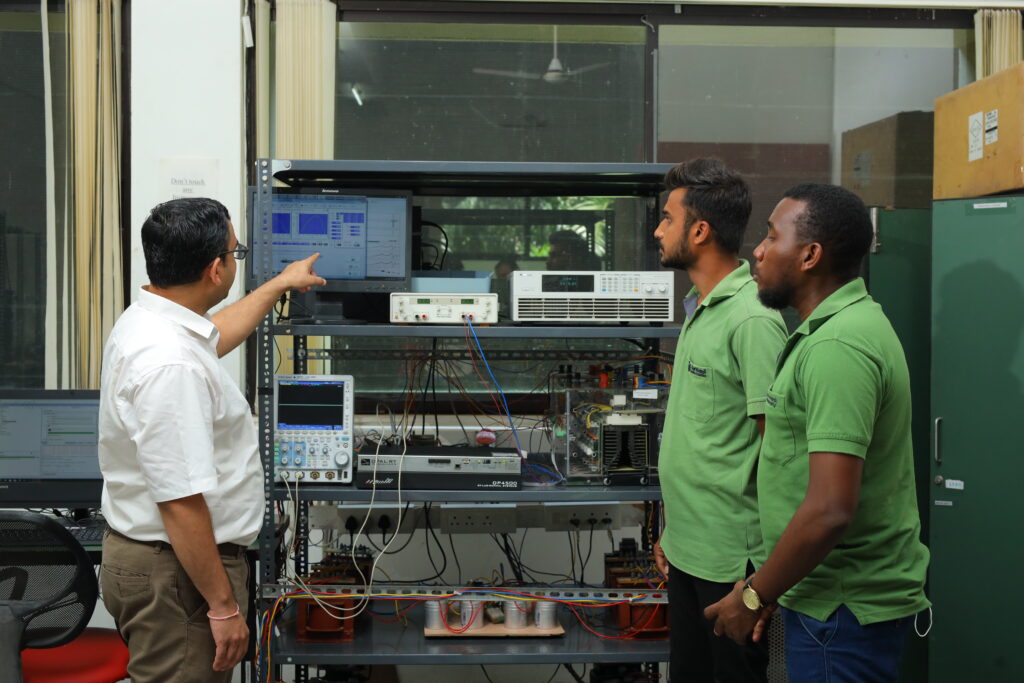

Library
There are two main libraries which make up the MU Learning Resource Centre. Specialist collections, use of up-to-date technology, and a team of enthusiastic and dedicated staff all combined to form a library which serves the Users of the Marwadi Education as well as contributes towards the research needs of the Institution, and is one of the best ICT-equipped academic libraries in the region.
![]() Fully equipped with RFID (Radio Frequency Identification Device) Technology
Fully equipped with RFID (Radio Frequency Identification Device) Technology
![]() Specially devised and designed Self KIOSK for Self Check in & Check out
Specially devised and designed Self KIOSK for Self Check in & Check out
![]() E-Resource Lab having 60+ computer systems with latest configuration to assist for online research and resources
E-Resource Lab having 60+ computer systems with latest configuration to assist for online research and resources
![]() Specially devised and designed Mobile Application having features of; Intimation, Alerts, History, Account Status and Books search facilities
Specially devised and designed Mobile Application having features of; Intimation, Alerts, History, Account Status and Books search facilities
![]() Connected with other libraries and resource centers to retrieve information resources worldwide Separate Study rooms and discussion rooms
Connected with other libraries and resource centers to retrieve information resources worldwide Separate Study rooms and discussion rooms
![]() Additional Transportation facility for special Late Evening & Sunday for Library users
Additional Transportation facility for special Late Evening & Sunday for Library users
![]() More than 50000 books in the library
More than 50000 books in the library
Scholarship

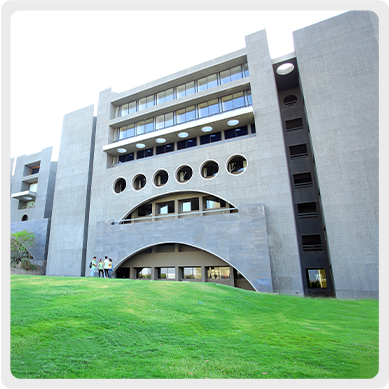
Campus Facilities
![]() Impressive Infrastructure
Impressive Infrastructure![]() IT Enabled Infrastructure
IT Enabled Infrastructure![]() Sports Infrastructure
Sports Infrastructure![]() State-of-the-art Classrooms
State-of-the-art Classrooms![]() Hostels with Gymnasium
Hostels with Gymnasium![]() Library with 50000+ Books
Library with 50000+ Books![]() Academic & Cultural Events
Academic & Cultural Events
Association with Foreign Universities


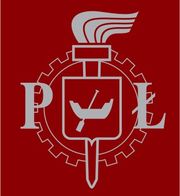
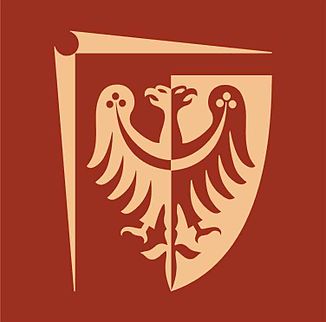

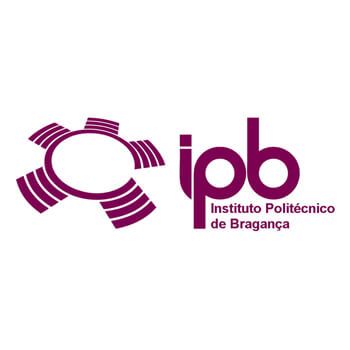

HOD's Message

HoD, Department of Electrical Engineering
Objective of the Electrical Engineering Department, Faculty of Technology is to prepare graduates as per industrial and societal needs. Graduates of the department will be skilled to work with the latest technology including DSP, Microcontrollers, Power Electronics, Renewable, modern computer tools etc. To achieve this goal, the department has a team of highly qualified, committed and self motivated learners who will nurture the career of young and enthusiastic students as teacher, guide and mentor. Laboratories are equipped with equipment that are in line with current industrial trends. Teaching -learning process is well defined and is student centric. The department will constantly interact with scholars from industry , research organizations and academia to produce globally competent and locally relevant engineering graduates. Above these, the department will nurture human values, sense of responsibility and ethics for all stakeholders.
Thanks and Regards
Our Recruiters




Faculties
Awards & Recognition
FAQ
Q. Is there any Loan Facility Available ?
https://www.marwadiuniversity.ac.in/student-loan/
Q. Is there any Scholarship Available ?
https://www.marwadiuniversity.ac.in/student-loan/
Q. How is the Placement at Marwadi University ?
Q. How to Reach MU ?
Q. Is there a Hostel Facility available at Marwadi University ?
Q. What is the Fee Structure of Degree Programmes at Marwadi University ?
Q. How to Apply for Admission at Marwadi University? What form to fill ?
Q. Is Marwadi University recognised by the Government ?
Q. What all Documents are necessary to bring in while joining the University ?
Q. Is there any Medical Facility provided ?



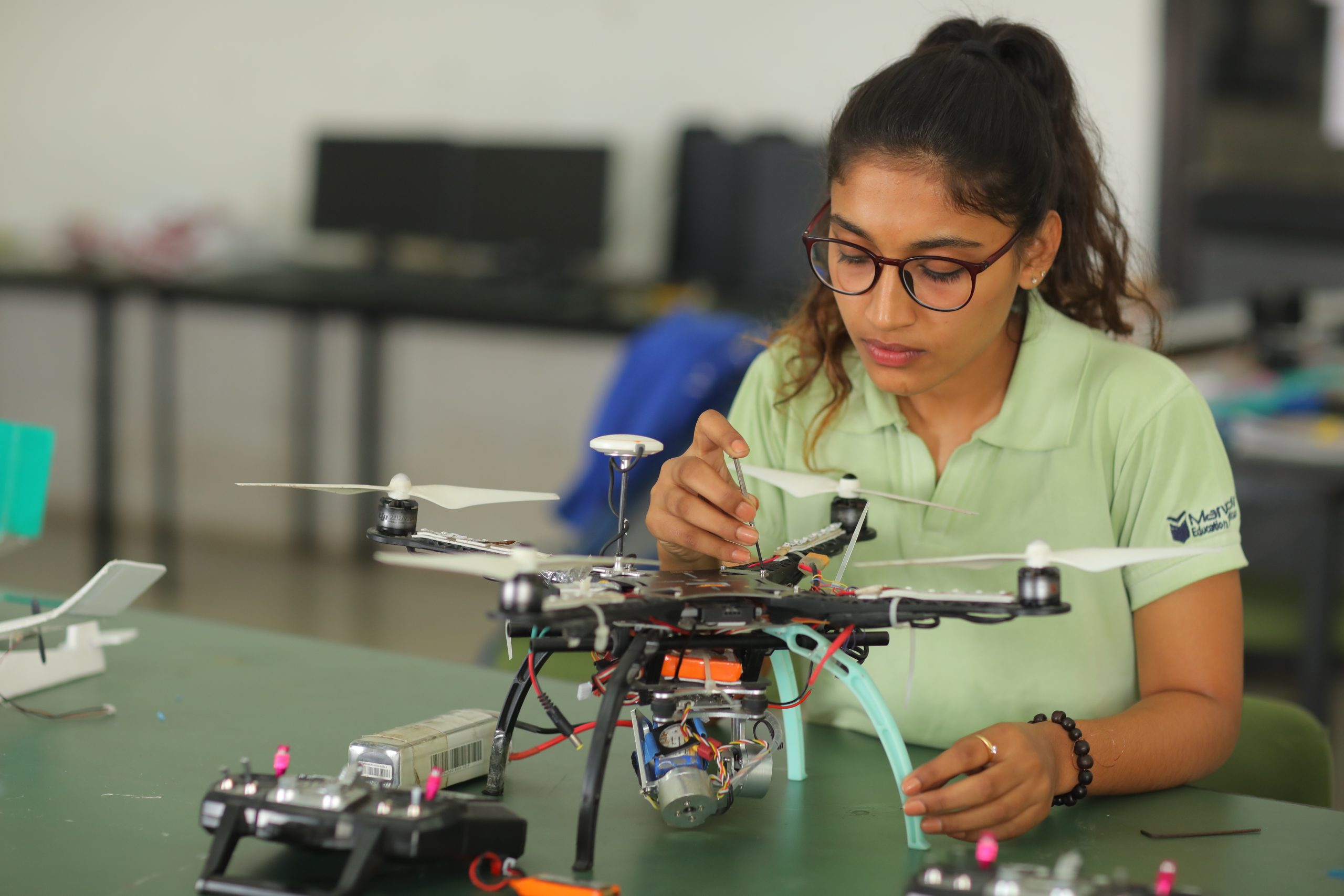

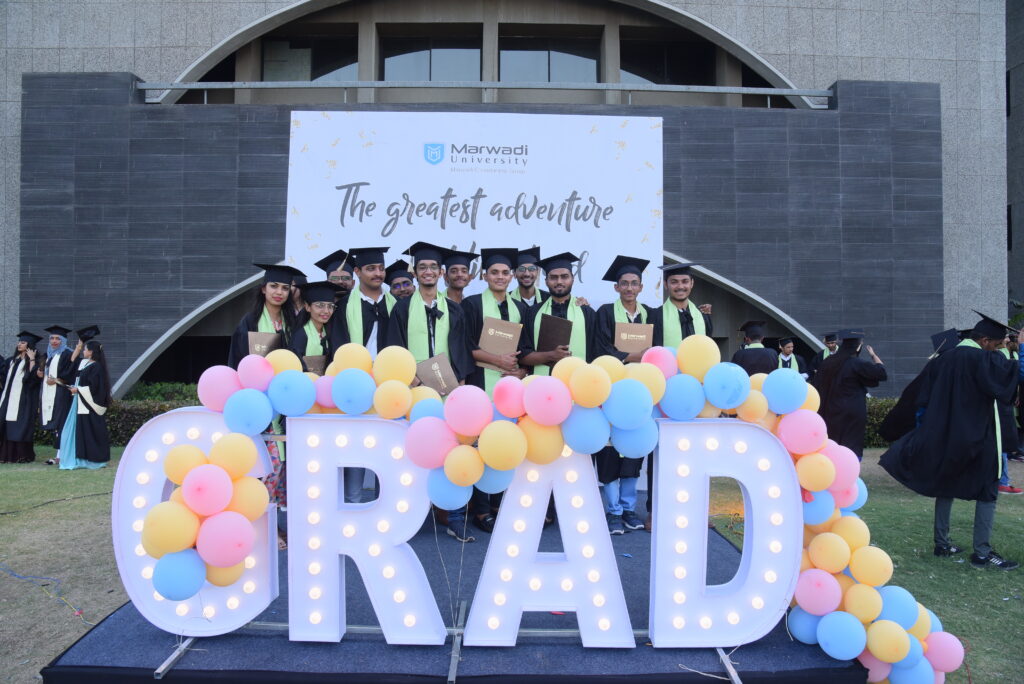



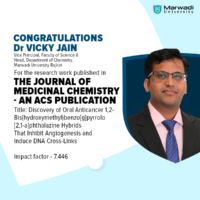

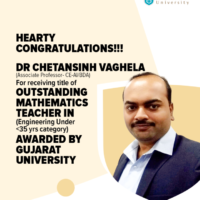
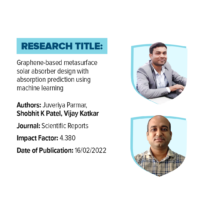
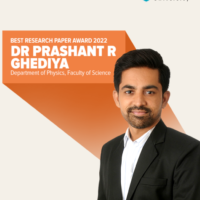


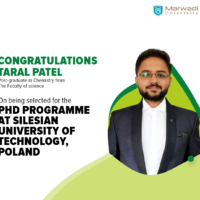


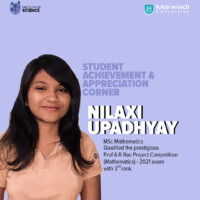








 International Airport
International Airport  Railway Station
Railway Station  GSRTC Bus Port
GSRTC Bus Port 